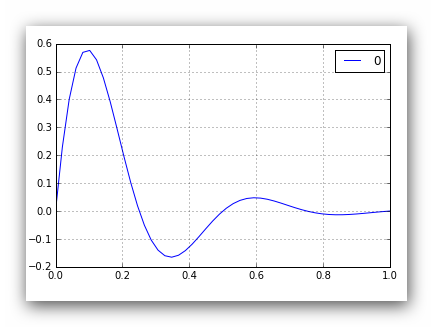python自学笔记15之实例之绘图、dataframe操作、读写csv,excle
用Python绘图,借助强大的numpy和matplotlib
import numpy as np
import matplotlib.pyplot as plt
import pandas as pd
x = np.linspace(0,1)
y = np.sin(4*np.pi*x)*np.exp(-5*x)
t = pd.DataFrame(y,index = x)
t.plot()
plt.show()用pandas写csv文件
from matplotlib.finance import quotes_historical_yahoo
from datetime import date
import pandas as pd
today = date.today()
start = (today.year-1,today.month,today.day)
quotes = quotes_historical_yahoo('IBM',start,today)
df = pd.DataFrame(quotes)
df.to_csv('stockIBM.csv')从工作目录下可以看到多了个stockIBM.csv的文件,需要注意的是:
MatplotlibDeprecationWarning: This function has been deprecated in 1.4 in favor ofquotes_historical_yahoo_ochl, which maintains the original argument order, orquotes_historical_yahoo_ohlc, which uses the open-high-low-close order. This function will be removed in 1.5
mplDeprecation)
意味着从matplotlib.finance中导入quotes_historical_yahool的时候出现了警告,
从matplotlib的官方帮助文档:这里,可以看到:
This module is deprecated in 1.4 and will be moved to mpl_toolkits or it’s own project in the future.
matplotlib.finance模块在1.4中不支持有其他变动,其他更详细的文档参看help
读取csv:
result = pd.read_csv('stockIBM.csv')单独一列的读取显示:
print(result['1'])
0 144.305395
1 137.217722
2 135.060600
3 136.495473
4 139.259276
5 139.394094
6 138.199971
7 132.816810
8 135.166530
9 135.243571
10 135.301350
11 134.839113
12 137.275500
13 136.370279
14 134.723651
...
238 156.990005
239 158.630005
240 158.899994
241 158.059998
242 157.669998
243 157.070007
244 156.839996
245 157.139999
246 156.710007
247 156.729996
248 154.970001
249 153.699997
250 154.470001
251 154.449997
252 150.020004
Name: 1, Length: 253, dtype: float64
注意不是索引是列名
创建一个DataFrame读入singer.csv
from matplotlib.finance import quotes_historical_yahoo
from datetime import date
import pandas as pd
df = pd.DataFrame({'singer':['the rolling stones','beatless','guns n roses','metallica'],'song':['satisfaction','let it be','dont cry','nothing else matters']})
df.to_csv('singer.csv')
result = pd.read_csv('singer.csv')
print(result['singer'])
0 the rolling stones
1 beatless
2 guns n roses
3 metallica
Name: singer, dtype: object
dataframe简单操作
列与列求和直接用+,赋值也是直接赋,千万别想太多
data = {'number':[1001,1002,1003],'name':\
['xiaoming','xiaohong','xiaohua'],'python':\
[77,88,99],'math':[87,82,91]}
df = pd.DataFrame(data)
df['sum'] = df['python']+df['math']注意append的使用,dataframe.append是添加行
注意DataFrame的生成方式,里面用了一个dict类型
读写excel
df.to_excel(‘grade.xlsx’)
pd.read_excel(‘grade.xlse’)
和csv类似
pandas官方文档:help
